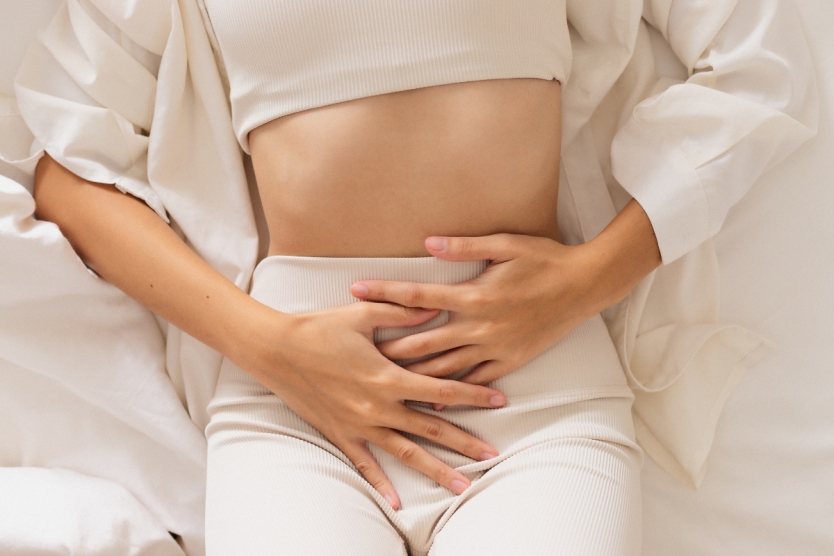For most of us, menstruation is a normal occurrence every month.
It might be a nuisance at times, but it isn’t life changing.
There are also many women who suffer from heavy periods, and if that includes you, don’t feel alone.
It’s estimated that menstrual irregularities impact up to one third of women globally. The subjective nature of defining “out-of-the-ordinary” uterine bleeding means that the reported prevalence can vary anywhere from 3 percent to 52 percent worldwide. Heavy periods can have a debilitating impact, and may even impact your quality of life.1
If you’re suffering heavy menstrual bleeding, we are here to help with some answers to your questions.
What Is The Difference Between A Heavy Period And A Regular Period?
Research into menstruation defines a range of issues as “abnormal uterine bleeding,” or AUB. Heavy periods specifically are known as heavy menstrual bleeding (HMB), which is defined as “excessive menstrual blood loss which interferes with a woman’s physical, social, emotional and/or material quality of life.”1
Doctors will call heavy periods “menorrhagia,” the medical term for menstrual periods with abnormally heavy or prolonged bleeding. Although heavy menstrual bleeding is a common concern, most women don’t experience blood loss severe enough to be defined as menorrhagia.2
The symptoms and issues it causes include heavy menstrual bleeding along with flooding accidents, discomfort, tiredness and depression.1 It’s a concern if you can’t maintain your usual activities when you have your period because you have so much blood loss and cramping.2
If you’re suffering from it, understand that while it is debilitating, it is most often not life-threatening. Iron deficiency and anemia, for instance, are common concerns that should be treated. And of course living with heavy periods can be life altering. Menstrual health complaints have an impact on all aspects of your life.1
So how do you know the difference between a heavy period and a regular period? Besides restricting your daily activities, here are some indicators of a heavy period:2
- Soaking through one or more sanitary pads or tampons every hour for several consecutive hours
- Needing to use double sanitary protection to control your menstrual flow
- Having to wake up to change sanitary protection during the night
- Bleeding for longer than a week
- Passing blood clots larger than a quarter
- Symptoms of anemia, such as tiredness, fatigue or shortness of breath
What Causes Heavy Periods?
It’s not always possible to know exactly what causes heavy periods, but there are some possibilities:2
- A hormonal imbalance, which can have a number of reasons including polycystic ovary syndrome (PCOS)
- Uterine fibroids or polyps
- Dysfunction of the ovaries
- A medication
- An inherited bleeding disorder
- Uterine or cervical cancer
Since there are various possible causes, it’s vital to seek diagnosis and treatment.
How To Stop Heavy Periods
A doctor will conduct a number of tests to diagnose the issue, including a blood test, PAP test, ultrasound and/or biopsy.3 Then a treatment option can be determined based on the cause.
For instance, birth control pills can help. That’s because the estrogen in birth control pills promotes thickening of the blood and clotting, which can decrease your flow and lessen the duration of the flow. It may even help with pain relief.4
A contraceptive intrauterine device (IUD) also affects the menstrual cycle and may lessen the amount of bleeding. If the issue is caused by fibroids or polyps, they may be surgically removed.5
An anti-inflammatory medicine such as aspirin or ibuprofen may help reduce cramping and the amount you bleed. And, if you have anemia as a result of the heavy loss of blood, you may need iron supplements.3
Don’t Suffer in Silence
Don’t wonder if your condition qualifies as “heavy periods” before you seek the advice of a doctor. In particular, if you have bleeding so heavy that it soaks at least one pad or tampon an hour for more than two hours, or you have bleeding between periods or irregular vaginal bleeding, you need to see a doctor.2 The same is true if you have any vaginal bleeding after menopause.
Use our Physician Finder to seek out a women’s health specialist if you’re worried about your heavy periods, or other irregular bleeding that concerns you.
















